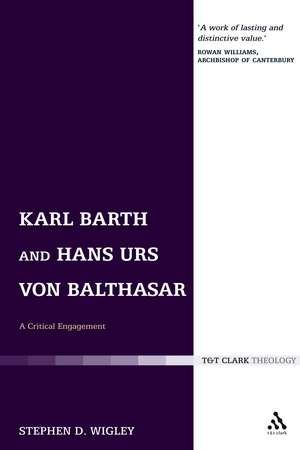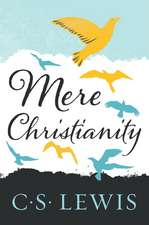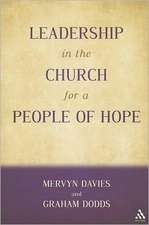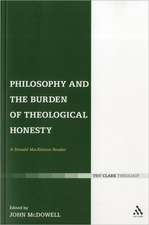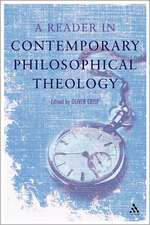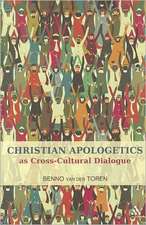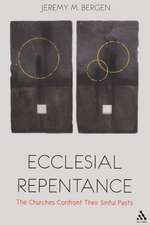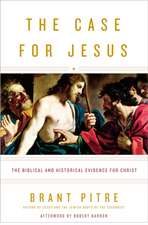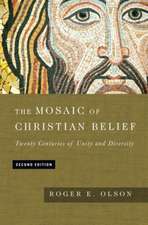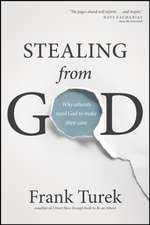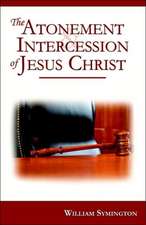Karl Barth and Hans Urs von Balthasar: A Critical Engagement
Autor Revd Dr Stephen Wigleyen Limba Engleză Hardback – 30 iun 2007
Karl Barth and Hans Urs von Balthasar are two of the most important theologians of the last century. Although one being Reformed and the other Catholic, they kept a lifelong friendship which also influenced their theological work. The book argues for the crucial influence of von Balthasar's meeting with and study of Barth for the emergence of his own great theological trilogy, beginning with The Glory of the Lord, continuing with the Theo-Drama and concluding with the Theo-Logic. In particular it argues that it is von Balthasar's debate with Barth over the analogy of being which is to determine the shape of von Balthasar's subsequent theology, structured as it is around the transcendentals of being, the beautiful, the good and the true.
Preț: 947.94 lei
Preț vechi: 1215.82 lei
-22% Nou
Puncte Express: 1422
Preț estimativ în valută:
181.47€ • 186.73$ • 152.97£
181.47€ • 186.73$ • 152.97£
Carte tipărită la comandă
Livrare economică 01-15 martie
Preluare comenzi: 021 569.72.76
Specificații
ISBN-13: 9780567031914
ISBN-10: 0567031918
Pagini: 192
Dimensiuni: 156 x 234 x 20 mm
Greutate: 0.45 kg
Editura: Bloomsbury Publishing
Colecția T&T Clark
Locul publicării:London, United Kingdom
ISBN-10: 0567031918
Pagini: 192
Dimensiuni: 156 x 234 x 20 mm
Greutate: 0.45 kg
Editura: Bloomsbury Publishing
Colecția T&T Clark
Locul publicării:London, United Kingdom
Caracteristici
This study argues that Von Balthasar's frienship with and study of Barth was a crucial influence in the emergence of his great theological trilogy
Cuprins
Introduction to the book
1) 'No brief encounter': the relationship between Barth and von Balthasar
2) 'From dialectic to analogy': The Theology of Karl Barth
3) 'Beauty and Being': The Glory of the Lord
4) 'Participating in the action': the Theo-Drama
5) 'Speaking the truth in love': the Theo-Logic
6) Anselm: a case study in the approaches of Barth and von Balthasar
7) Epilogue & concluding reflections (including Concluding Unscientific Postscript)
1) 'No brief encounter': the relationship between Barth and von Balthasar
2) 'From dialectic to analogy': The Theology of Karl Barth
3) 'Beauty and Being': The Glory of the Lord
4) 'Participating in the action': the Theo-Drama
5) 'Speaking the truth in love': the Theo-Logic
6) Anselm: a case study in the approaches of Barth and von Balthasar
7) Epilogue & concluding reflections (including Concluding Unscientific Postscript)
Recenzii
"In this excellent study, Stephen Wigley traces the conversation with great clarity. Writing from an encyclopaedic knowledge of the primary texts (no mean achievement, given the volume of work involved), and a wide critical engagement with recent scholarship, he gives us an overview of this ecumenical enterprise that is readable, original and comprehensive, filling a noticeable gap in recent English-language studies. To all this, he brings his own perspective as a Methodist and an experienced pastor, producing a work of lasting and distinctive value." From the foreword by Rowan Williams, Archbishop of Canterbury
"An extremely interesting introduction to von Balthasar's thought, as well as advancing scholar's understanding of the way that Balthasar's work has been driven by a concern with the analogy of being." Prof John Riches, University of Birmingham, UK
'What Wigley has achieved in this book is an account of two theological friends, whose differences were never negotiated away in a bland and ultimately false ecumenism...Wigley has also shown that an ecumenical theology needn't be about lowest common denominators, or agreed statements that understate difference. It can be discussion about the core doctrines of the Christian faith, as lived, thought and articulated by theologians from across the Christian spectrum, in which difference does not provoke defensive hostility, but evokes an exchange of truth as each understands it.' Living Wittily Blog
"Stephen Wigley has engaged two of the giants of twentieth-century theology and emerged sane and lucid, no mean feat. His book, ...distils his doctoral thesis into a remarkably concise and clear account of von Balthasar's theology and how it was influenced by, and in turn ionterpreted, the theology of Karl Barth" Epworth Review, April Edition, 2008
'an important book...clearly written by a specialist for those who are already familiar with his writings.' Rev David Blatheriwck, Methodist Recorder
"This fine study demonstrates a solid command of the primary sources, is clearly written, and argues its case effectively. Every Balthasar scholar and every theological library will wish to own a copy." -- Edward T. Oakes, S.J., University of St. Mary of the Lake, Modern Theology
"An extremely interesting introduction to von Balthasar's thought, as well as advancing scholar's understanding of the way that Balthasar's work has been driven by a concern with the analogy of being." Prof John Riches, University of Birmingham, UK
'What Wigley has achieved in this book is an account of two theological friends, whose differences were never negotiated away in a bland and ultimately false ecumenism...Wigley has also shown that an ecumenical theology needn't be about lowest common denominators, or agreed statements that understate difference. It can be discussion about the core doctrines of the Christian faith, as lived, thought and articulated by theologians from across the Christian spectrum, in which difference does not provoke defensive hostility, but evokes an exchange of truth as each understands it.' Living Wittily Blog
"Stephen Wigley has engaged two of the giants of twentieth-century theology and emerged sane and lucid, no mean feat. His book, ...distils his doctoral thesis into a remarkably concise and clear account of von Balthasar's theology and how it was influenced by, and in turn ionterpreted, the theology of Karl Barth" Epworth Review, April Edition, 2008
'an important book...clearly written by a specialist for those who are already familiar with his writings.' Rev David Blatheriwck, Methodist Recorder
"This fine study demonstrates a solid command of the primary sources, is clearly written, and argues its case effectively. Every Balthasar scholar and every theological library will wish to own a copy." -- Edward T. Oakes, S.J., University of St. Mary of the Lake, Modern Theology
